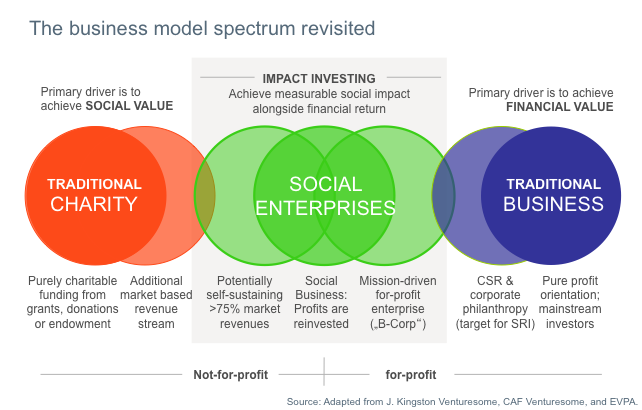Part 1 of 2
The Social Enterprise Model
Social enterprises are on the rise and they’re demonstrating a new way of doing business. Emerging from the innovations of decades of social initiatives, they are now reshaping companies in ways not thought possible. And there’s much we can all learn from their example.
The social enterprise movement isn’t just a small niche focused on causes in the developing world. Estimates suggest that there are 62,000 social enterprises in the United Kingdom with revenue of £24 billion. In the United States a recent survey suggested that social enterprises could potentially account for up to $500 billion in revenue.
This industry is blurring the lines between for-profit businesses and the non-profit sector. On one side are non-profits (or the more aptly described not-for-profits), organizations that use their proceeds for the benefit of a social problem. On the other are for-profit companies that direct their earned profits to the owners, such as the partners or shareholders.
For-profit companies can still be involved in social missions, but today this is largely in the form of corporate social responsibility (CSR) and philanthropy arms. These programs are typically an appurtenance to the primary service of the business where consumer and shareholders’ interests are at stake.
Social enterprises fit somewhere in the middle of the business spectrum. Jonathan Greenblatt, Director of the Office of Social Innovation and Civic Participation in the U.S. Domestic Policy Council, describes a social entrepreneur as someone who creates change through a market based approach using direction action. Rather than trying to change the market environment through say lobbying or policy changes, they come up with solutions using a business model.
Take for example VisionSpring, which trains local entrepreneurs to check eyesight and sell eyeglasses. Their model tackles both unemployment and healthcare needs. Or Ethos Water, now a Starbucks subsidiary, which donates a portion of revenues towards water and sanitation initiatives.
The Benefits of Social Entrepreneurship
The recent growth in popularity and size of socially-conscious companies is reshaping markets around the world. Consumers in particular are demanding more from their products. The sophistication of Millennials, driven by information ubiquity, is putting pressure on companies to connect consumption to cause.
Today, companies are reviewing their entire supply chain, including the labor, materials, transport, and logistics of operations. They are being more transparent with the allocation of their profits. Third parties are able to attest to a company’s social impact, such as the B-Corp certification or the Impact Reporting and Investment Standard (IRIS).
In the past, companies would eschew social causes, seeing them as a cost or logistical burden. Today, social enterprises are proving that adopting a socially-conscious business model has many benefits.
On the top line, companies gain brand differentiation and customer engagement. They attract sophisticated consumers attracted to socially minded companies or a new consumer base that typically might be overlooked or priced out in a traditional for-profit approach. Cone Communications and Echo Research found that
90 percent of shoppers worldwide are likely to switch to brands that support a good cause, given similar price and quality.
These consumers are also having deeper, richer conversations with companies. When a brand stands behind a vision, they can connect with consumers on a whole new level.
On the bottom line, companies can gain cost savings and long term sustainability. For example, reducing the amount of packaging required for shipping can immediately reduce costs but also ensure companies don’t need to reconfigure supply chains in the future.
Even internally, a company benefits from adopting a social enterprise model. Employees become motivated by a higher purpose in their companies. They also strive for higher innovation, to ensure their products are sustainable and socially conscious. Moreover, as Millennials become a more dominate part of the workforce, corporate culture will need to change. A study by Brookings Institute states that two-thirds of Millennial employees said they wanted their employers to contribute to solving social problems, compared to only half of Baby Boomers and Generation Xers.
On the grander scale, it behooves all companies to adopt some mix of social awareness. Pressing issues like global warming, deforestation, food security, and human rights abuses can only be overcome by integrating social entrepreneurship into the market. Today’s social enterprises will hopefully be seen as pioneers for tomorrow’s new industries.
